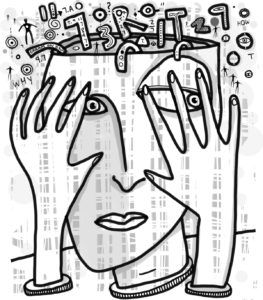
ARE YOU AFRAID of your dreams?
I’m not talking about your nightmares. I mean the good ones—your hopes, your blue-sky aspirations. I know it sounds a little odd to be frightened of your own better future, but think about it. . . . There’s an internal critic in our heads that’s always terrified, always on the lookout for danger. I’m not saying it isn’t helpful or even a lifesaver at times. If you were going to do some- thing truly stupid it’d be the first to shout: “Hey, idiot, don’t stick your head in that bonfire!” But that same critic can hold you back. Wanting to be an opera singer or an anesthesiologist or wanting to run a marathon, or lose twenty pounds, or pilot a bathyscaphe or tell your mother you love her . . . these aren’t fires to be avoided— they’re flames you want to fan. So why does this protective voice regularly perceive these good dreams as threats and prevent you from pursuing them? Why is it that you’re so much better at put- ting the brakes on your creative ideas than you are at making them come true? And what if you could change that?
In the fall of 2011, artist Candy Chang found an abandoned building in New Orleans and turned it into a touchstone of hope, in part by using hearse-black paint and the word die. It’s hard to picture anything that grim eliciting optimism, but Chang’s idea was as profound as it was elegant. After painting the entire build- ing black, she stenciled this declaration on its side countless times, in white:

Since she did this, hundreds of people have visited the site to fill in their own answers with colored chalk.Her experiment has since been covered extensively in media and replicated in cities all over the world. So before we embark, think for a moment about the “abandoned buildings” in your life—the goals you’ve given up on, or put on hold for so long you no longer recognize them. How would you fill in that sentence? “Before I die, I want to .”
I TOO HAVE experienced firsthand what it’s like to feel the pain and the joy of pursuing a dream. I’m a musician, a songwriter, and a performer. I’ve made twenty critically acclaimed recordings, including five albums of children’s music. I’ve had three major-label recording contracts. I’ve toured the United States at least thirty times. I’ve even performed in Soviet Central Asia (to my knowledge I’m the only American rock musician to have ever played the Lenin Palace of Culture and Sport, in Tajikistan). I’ve composed music for several films and network television shows, and been nominated for an Emmy and a Grammy. Ever since the fifth grade I dreamed of being a rock star, and after years of hard work and abundant good fortune, I actually became one.
Unfortunately, in the past few years the Internet has caused major disruptions in my business. In case you haven’t heard: Al- most nobody’s paying for music anymore. My cousin Lawrence, a diamond dealer from Chicago, asked me to explain the problem. By way of metaphor, I told him to cup his hands under his computer screen and imagine that all the diamonds he is trying so hard to sell simply fall into his hands for free. “That’s rough,” was all he had to say. Indeed. As a result of the changes, I had to answer the question of what I wanted to do with my life—again.
The radical shifts I had to undergo led me to a place where you might be this very moment, where being creative and following your dreams isn’t just some fun idea; it’s imperative. No matter if you’re a high school student, a housewife, a parasailing instructor, or the CEO of an organic kale distributorship, you will find out sooner or later that the way you’ve been doing things up until now will eventually need to change. In my case, the way I used to do things definitely didn’t work any longer. The upheavals I was experiencing prompted a serious need to re-create and rebrand myself. I was forced to conjure up the same red-hot creative resources I had brandished as a young man. I never considered that what I’d been doing when I was twenty-two, and what I’d spent my adult life learning to master, would simply stop being effective financially when I hit fifty-two…
